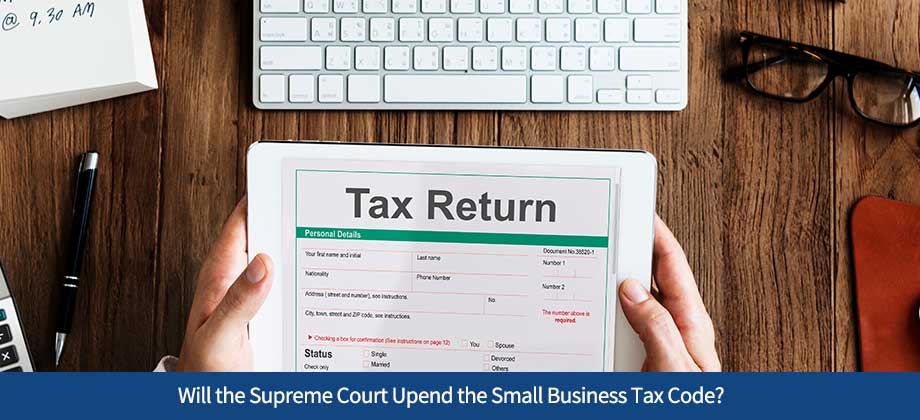Will the Supreme Court Upend the Small Business Tax Code?

As a business owner, you’re accustomed to a certain measure of volatility, teetering on the edge of opportunity and risk. But what if an institution as unyielding as the U.S. Supreme Court were to hand down a ruling that could upend the very basis of your financial planning? In a seemingly quiet moment amid political turmoil, the highest court in the land finds itself at the center of a tax dispute that has industry leaders and financial experts holding their breath. The federal tax code is a labyrinth of regulations and exemptions, balancing the books for the nation and stewarding the economy. But one case, Moore v. United States, has the potential to send shockwaves through that delicate system.
The Taxing Question Before the Nine Judges
The case of Moore v. United States is not one that will splash across the headlines like a sprawling epic of crime or controversy. It’s a case of nuance, legalese, and esoteric financial dealings. But its consequences could resonate for generations. The crux of the matter lies in whether Congress has overstepped its bounds by imposing taxation on income that has not yet been realized—namely, the one-time mandatory repatriation tax on foreign income accrued by companies between 1986 and 2017.
The legal principle at stake seems arcane, but it’s a linchpin of the U.S. tax system. Income, traditionally, must first be “realized” before it can be taxed. In the case of corporate earnings sheltered overseas, that might mean that tax is due only when those earnings are brought back to the U.S. and converted into profit on a balance sheet. But if the provision under scrutiny is struck down, it could open a Pandora’s box of legal challenges to existing tax laws.
The Potential Fallout
Should the Supreme Court rule against the government, it could place the federal government’s authority to tax on shaky ground. “The outcome of this case may severely constrain the ability of Congress to tax unrealized income,” wrote Eric Toder, an Institute fellow at the Urban-Brookings Tax Policy Center, in a prescient report. “It could place long-standing provisions of the federal income tax at risk.”
For small business owners and entrepreneurs, the stakes are particularly high. If the one-time repatriation tax is deemed unconstitutional, what’s to stop similar provisions for domestic earnings that have been deferred, as with capital gains or certain retirement accounts? The very certainty that business owners rely upon to operate could be in jeopardy, as the floodgates to tax litigation open.
Preparing for the Verdict
Like an impending storm, this case demands preparation and calculated response from business owners. It’s time to revisit tax strategies, assess the vulnerability of deferred revenues, and perhaps even rethink the calculus of corporate structure. This is not to sound an alarm, necessarily, but to underscore the importance of vigilance.
The tax code, after all, is not just a mechanism for collecting revenue; it’s a tool for governance. It shapes behavior, incentivizes investment, and can be a cudgel or a carrot to certain sectors of the economy. A substantial whittling away of the code’s functionality could have broader implications than dollars and cents. It could change the landscape of business in the U.S.
Compliant Complexity: A Need for Simplification
Underlying the legal tussle in Supreme Court is a deeper malaise—a tax code that is byzantine in its complexity. A simpler, more transparent tax system could obviate the need for such convoluted legislation that lands at the justices’ doorstep. The need for tax reform is not new, but the urgency has never been clearer.
The Tax Cuts and Jobs Act of 2017 was, in some ways, a response to that clamor for simplicity, yet it spawned the very provisions now under threat. Real, lasting reform will require a rethinking of what the tax code is meant to achieve, and a thorough reevaluation of how it goes about its business.
The Supreme Court’s decision on Moore v. United States is not merely a legal matter. It is an economic and policy crossroads that could lead to upheaval or opportunity. For small business owners and entrepreneurs, it’s a call to action. Stay informed, stay engaged, and be ready to adapt. The winds of change can be harnessed for progress, but only with foresight and resolve.
In the meantime, the eyes of the nation’s enterprising class will be fixed on the Supreme Court, awaiting their judgment on the tax code. The final decision could reshape not only tax law, but the future of American business enterprise.
Your privacy is important to us. ARF Financial will never sell or rent your information to any third party. Click here for more information about our privacy policy.

